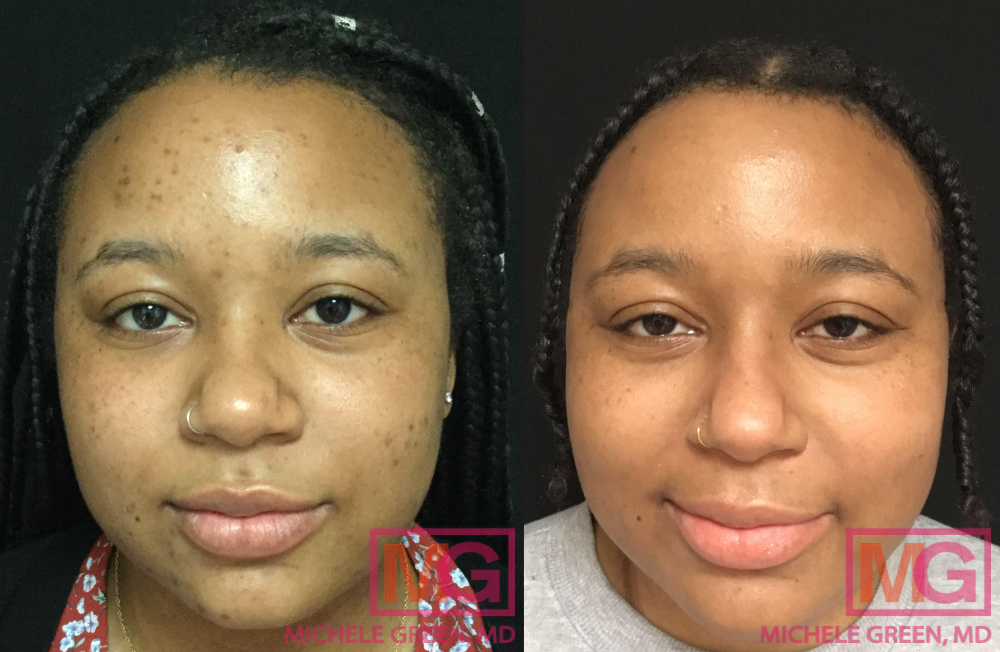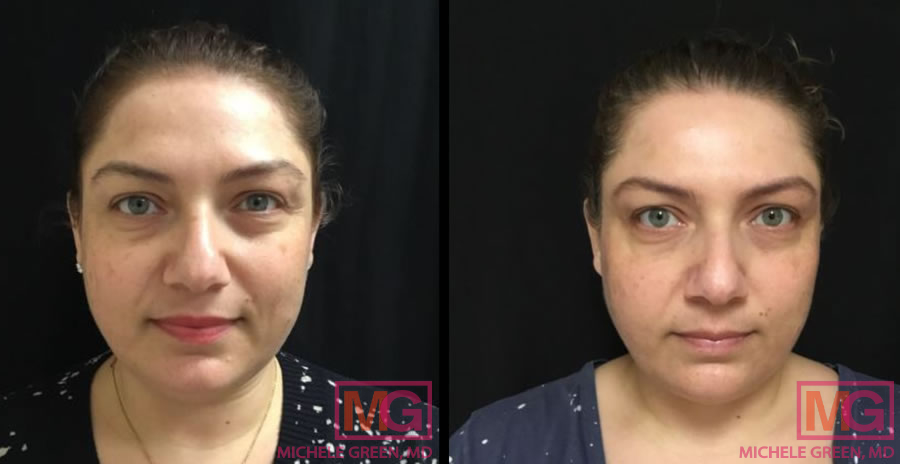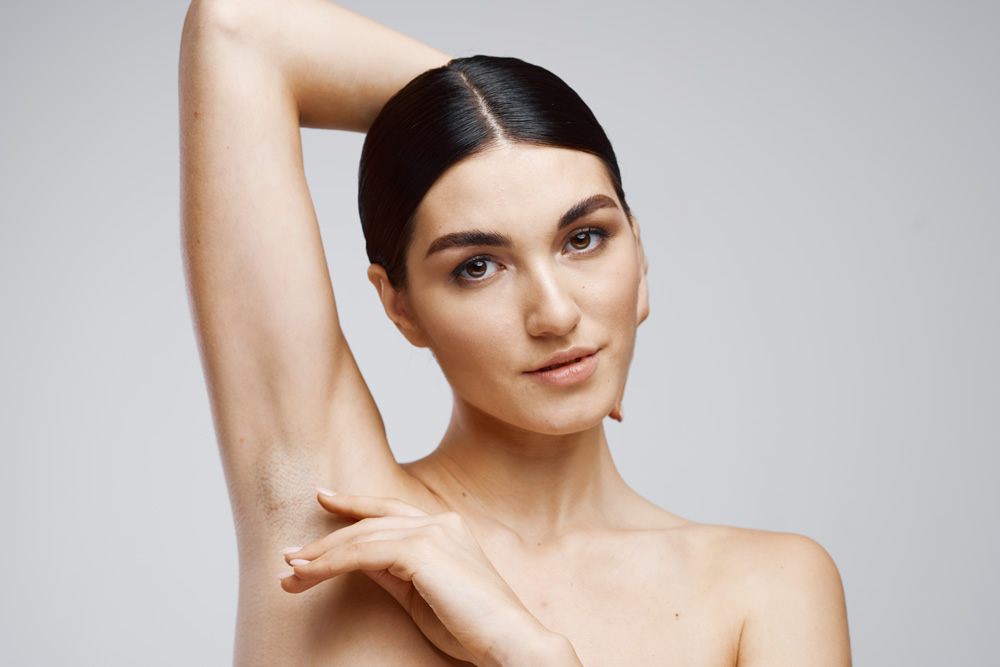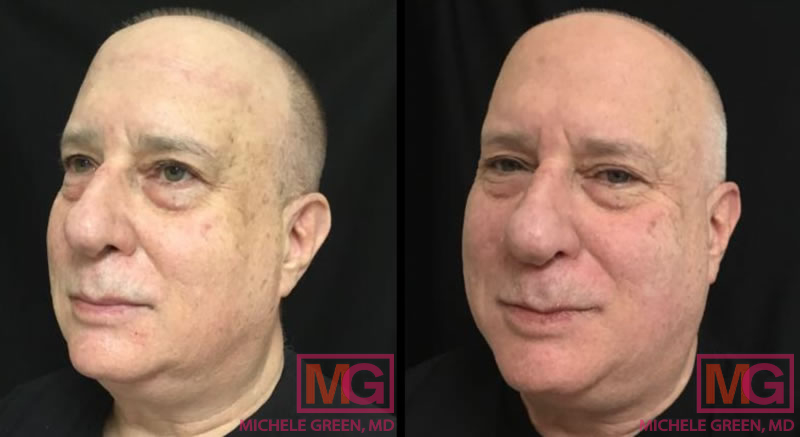Acne Dark Spot Treatment
Those of us who have experienced acne breakouts – which, as it turns out, includes the majority of teens and adults – have often breathed a sigh of relief when a blemish disappears. However, for many patients, a painful acne breakout can lead to a dark mark or scar where a pimple once stood.
After a blemish subsides, patients often see a brown or red spot that affects the texture of the skin. For many, this mark is temporary: patients who see red spots or swelling are typically noticing post-inflammatory hyperpigmentation, which is a temporary mark caused by irritation from an acne infection on the surface of the skin. The skin reacts sensitively to the injury that is caused by excess oil production and bacteria, and thus creates a red, pink, tan or brown mark behind. Post-inflammatory hyperpigmentation can often go away on its own, or be treated more quickly through the use of curated gels and treatments in order to help soothe the skin.
However, for some who suffer from dark spots due to acne, the dark spot can have either an atrophic or hypertrophic appearance. These acne scars can cause unwanted discoloration that, if not treated by an expert dermatologist, can be permanent. Particularly for patients who experience hypertrophic scars or keloids, working with a thoughtful medical professional can make all the difference in addressing acne scars without irritating the surrounding skin.
If you’re frustrated by the appearance of acne dark spots, board-certified dermatologist Dr. Michele Green is here to help in NYC. Dr. Green is a well renowned expert in acne, acne surgery and hyperpigmentation. Whether you are suffering from acne breakouts, dark spots, facial or body hyperpigmentation, Dr. Green will brighten your skin, and give you the beautiful, clear, skin you deserve. With over 25 years of experience in cosmetic dermatology, with her own MGSKINLABs line of products to treat hyperpigmentation, Dr. Green is consistently voted one of the best dermatologists in New York and will help rejuvenate and restore your skin.

28 yr old female – Accutane and dark acne spot treatment
How do dark acne spots on the face develop?
Dark acne spots on the face typically develop due to an acne lesion that causes irritation to the surface of the skin. This irritation can lead to a cluster of cells that contain more melanin, which creates a dark spot on the skin. Commonly, dark acne spots are caused by picking at or attempting to “pop” pimples, which in turn can disrupt a pore. This is part of why it’s so important to treat acne through a personalized acne treatment plan, rather than through DIY methods. However, dark acne spots can also affect patients who simply suffer from painful zits or cystic acne, which can irritate the skin surrounding it, creating discoloration where the blemish once was.
Different Kinds of Acne Dark Spots
The most common form of acne dark spots is post-inflammatory hyperpigmentation. This discoloration is temporary, and typically appears as flat, dark spots that vary in color from pink or red to tan or brown. Post-inflammatory hyperpigmentation is temporary, and can often be treated with over-the-counter skincare products, but many patients find that this recovery process is slow-going. Post-inflammatory hyperpigmentation can last anywhere from three months to two full years before it fades on its own, which is why so many patients turn towards the world of dermatology for treatment. When you work with Dr. Green, she’ll be able to develop a treatment plan that not only boosts the healing processes of the skin, but also prevents future breakouts.
The next most prevalent form of acne dark spots is derived from patients who experience tissue damage after an acne breakout, leading to a small indentation on the dermis, known as an atrophic scar. Atrophic scars appear as icepick, boxcar, or rolling scars, and patients often observe a darkened pigment along the scar. In some cases, patients may have overactive collagen production while the skin is healing from an active lesion, which leads to a hypertrophic scar or keloids. In the case of both atrophic and hypertrophic scars, these acne scars–and any discoloration along the scar–are permanent, and require dermatological intervention.
Will acne dark spots go away?
For patients who experience post-inflammatory hyperpigmentation, acne dark spots will eventually fade on their own. Spots with darker pigment that are neither raised nor indented can also be treated through various skincare and in-office treatments in order to quickly and effectively heal the skin. Through treatments such as chemical peels, HydraFacial’s, or tailored skincare products, patients with post-inflammatory hyperpigmentation can experience clear, revitalized skin in as little as one treatment session.
For patients who are experiencing atrophic or hypertrophic scars, these dark spots are largely permanent, and require the help of an expert dermatologist to reduce their appearance. Due to this, Dr. Green has perfected a variety of in-office treatments that can help to boost cell turnover, exfoliate the surface of the skin, and restore the health of the skin.
In the case of hypertrophic scars, Dr. Green highly encourages patients to work closely with a medical professional to heal an acne dark spot without risking additional skin irritation. Dr. Green commonly treats patients with hypertrophic scars through treatment plans that include varied combinations of steroid injections, V-Beam laser sessions, and at-home skin care regimens, in order to restore the skin without creating further damage to the surrounding pores. Non-invasive procedures are typically the most effective treatments for reducing the appearance of hypertrophic scars or keloids.

AlexTrivantage for dark spots: 40 year old woman, 2 months before and after
How to get rid of acne dark spots and acne scars
In order to remove acne dark spots or acne scars, doctor-recommended skin care products are often the first step. Curated skin care products with restorative ingredients such as retinol, hydroquinone, kojic acid, or alpha hydroxy acids, can help to brighten an acne-caused dark spot. In addition, in-office treatments are a popular method to reduce the appearance of both post-inflammatory hyperpigmentation and permanent acne scars.
When it comes to reducing discoloration due to acne, Dr. Green often recommends traditional and enhanced Microneedling procedures, laser skin resurfacing, chemical peels, and steroid injections. In some cases, patients with atrophic scars can rely on dermal fillers (such as hyaluronic acid fillers) to restore collagen and volume to the skin, which in turn can reduce the appearance of indented scars. Patients who suffer with acne dark spots typically opt to build a treatment plan with Dr. Green that combines at-home and in-office treatments in order to quickly, safely, and effectively reduce the appearance of acne scars and related dark spots.
How to get rid of acne dark spots from a pimple overnight
Unfortunately, acne dark spots do not typically disappear overnight. However, thanks to advancements in the world of dermatology, patients can see substantial reduction in acne dark spots and acne scars in as little as a single scar removal treatment session. Additionally, curated skincare regimens and procedures (such as chemical peels or HydraFacial) can be particularly effectively for patients with post-inflammatory hyperpigmentation. Nevertheless, for most patients, multiple laser treatments or Microneedling procedures will be needed to fully eliminate a permanent acne scar.
How a dermatologist can help
When it comes to treating acne scars and acne dark spots, working with a dermatologist is always the best option. Dr. Green is an expert in treating active acne lesions, breakouts, and scars, and she routinely helps patients suffering with acne and acne scars to completely restore a clear complexion. Additionally, by working with an expert dermatologist, you’ll receive tailored guidance that can quickly and safely reduce the appearance of discoloration without risking additional irritation or damage to the skin. Dr. Green offers a variety of FDA-approved, in-office treatments to control acne breakouts and reduce the appearance of acne scars, including post-inflammatory hyperpigmentation, atrophic scars, and hypertrophic scars.
Treatment for Hyperpigmentation
Hyperpigmentation can appear in a variety of ways, from post-inflammatory hyperpigmentation to sun damage to Melasma. In many cases, Dr. Green has treated patients who have developed hyperpigmentation due to laser treatment inappropriate for their skin type they have received elsewhere. This is why Dr. Green emphasizes the importance of matching the appropriate laser to every skin tone and skin type with each of her patients.
In order to treat post-inflammatory hyperpigmentation, Dr. Green relies on her MGSKINLABS line of products that include active ingredients like hydroquinone, Kojic acid, Vitamin C, retinoid and protective sunscreens to treat dark marks on the skin. Dr. Green also offers specialized chemical peels to revitalize the skin and reduce the appearance of skin imperfections, including fine lines and wrinkles. Smaller dark spots due to sun damage can also often be treated by the Candela Alex-Trivantage laser.
Acne dark spot treatment options
When it comes to treating permanent acne scars or acne dark spots, Dr. Green relies on a variety of in-office treatments such as chemical peels, Pulsed Light, Candela Alex-Trivantage, Clear + Brilliant, and Fraxel Dual laser. Additionally, microdermabrasion, Microneedling, and HydraFacial can also be a helpful tools when it comes to evening skin tone and reducing the appearance of discoloration.
For patients who suffer from Melasma, Dr. Green is careful to limit the use of laser resurfacing, as certain lasers can exacerbate discoloration due to Melasma. This is why Dr. Green develops treatment plans for Melasma that rely on Chemical peels, Cosmelan peels, Mesopeels, and topical lightening spot treatments.
Chemical Peels
Chemical peels are a unique, tailor-made way to improve the appearance of acne dark marks. When it comes to treating hyperpigmentation or dark marks due to sun damage, Dr. Green recommends chemical peels that use glycolic acid or salicylic acid to gently exfoliate the skin and boost cell turnover. Additionally, chemical peels can be formulated with gentle active ingredient like lactic acid for those with sensitive skin.
For patients who suffer from atrophic acne scars, the TCA Cross is a powerful tool. TCA Cross uses a high-strength serum of Trichloroacetic acid that is applied directly on to an individual acne scar, which in turn can heal the damaged skin and eliminate scarring. This is a highly effective treatment option for patients with lighter skin tones.
Cosmelan Peels
The Cosmelan peel is an innovative treatment for patients dealing with acne scar discoloration, hyperpigmentation, or Melasma. The Cosmelan peel is made up of lightening ingredients and enzymes, such as arbutine, azelaic acid, kojic acid, licorice, and phytic acid, among others. The peel is applied in-office, and then removed several hours later at home with a gentle cleanser. The peel acts as an exfoliant to remove the top layers of dead skin cells and debris and expose smooth, healthy new skin. The Cosmelan peel is a popular option for patients who suffer from skin discoloration. As with any chemical peel, the Cosmelan peel requires strict sun avoidance post-treatment, as well as the use of a daily sunscreen, in order to allow the skin to fully repair itself.
Mesopeels
The Mesopeel is a chemical peel specifically formulated to treat hyperpigmentation, dark spots, and melanocyte activity. Mesopeels use chemexfoliation to incite new elastin and collagen production within the reticular dermis, which in turn gently and effectively fades dark spots on the skin. The Mesopeel is designed specifically for discoloration in more sensitive areas of the body without any discomfort or downtime.

Brightening Facials
For acne dark spots, Facials can be an exciting tool. Dr. Green’s acne facial, particularly when paired with MGSKINLABS at-home three-step acne regiment, can help to control active acne breakouts and heal acne scars. Additionally, the HydraFacial is a unique, medical-grade facial that can clear the skin of harmful pore congestion and help to rejuvenate the skin. It uses a unique HydraFacial active-4 cleanser that both cleans and hydrates the skin, followed by an exfoliating process that uses vortex suction to clear the skin of dead skin cells and other impurities. The final step of the HydraFacial is the application of intensive serums to rejuvenate the skin. During this phase, Dr. Green can apply Brightalive Serum, which combines alpha arbutus and bioengineered plant phytotechnology to brighten the skin. Brightalive serum can also be complemented by the use of moisturizing ingredients, such as aloe vitamin E serums, to help patients dealing with dryness along the surface of the skin. The HydraFacial, which can also be combined with chemical peels to enhance results, is an effective option when it comes to reducing the appearance of discoloration on the surface of the skin.
Microneedling
Microneedling, also known as collagen reduction therapy, uses a series of tiny pinpricks along the surface of the skin to stimulate the wound-healing properties of the body. Through this system, new collagen production is sent into overdrive, and the body’s natural memory of any scars or skin imperfections is disrupted, allowing the skin to restore itself. Additionally, Microneedling creates micro-channels deep into the dermis that allow for the absorption of intensive serums, such as platelet-rich plasma (PRP), which help to further revitalize the skin.
An innovative new treatment in the world of Microneedling is that of the Vivace Microneedling System. Vivace combines radiofrequency energy, Microneedling, and LED light therapy to boost collagen and both tighten and repair skin, which evens out skin tone and texture. It’s an excellent option for reducing the appearance of acne scars, and can be used in combination with nourishing serums or laser treatments to quickly reduce discoloration on the surface of the skin.
Laser Skin Treatments and Laser Resurfacing
When it comes to reducing the appearance of acne scars, laser skin resurfacing can be a highly effective tool. eMatrix, V-Beam, and Fraxel Dual laser treatments are each excellent methods to eliminate acne scars and even out skin tone. The eMatrix laser is safe to use on all skin types, and stimulates new elastin and collagen production in order to create health new skin. The V-Beam laser can be used to treat atrophic and hypertrophic scars alike, and is safe for patients with sensitive skin. Lastly, the Fraxel Dual laser relies on fractional resurfacing technology in order to kick start precise, rapid healing of atrophic acne scars.
Blu-U Photodynamic Therapy
For those who suffer from ongoing acne breakouts, post-inflammatory hyperpigmentation, and acne scarring, Blu-U Photodynamic Therapy is a game changer. The Blu-U light is able to reduce oil production on the skin, thus eliminating acne-causing bacteria and helping to heal active acne lesions. When combined with V-Bream or Intense Pulsed Light lasers, Blu-U Photodynamic Therapy is able to treat active acne lesions and reduce the appearance of acne scars to wonderful effect.
Can laser treatment remove dark spots?
Laser treatment may not the best way to remove acne dark spots or post-inflammatory hyperpigmentation. It is very important to be cautious about laser treatments and to make sure that the treatment will be safe to use on your unique skin type. Depending on the cause of these dark spots, other topical treatment, peels, Cosmelan, Mesopeels, or bleaching creams may be best for you. Dr. Green has worked with many patients who had previously received inappropriate laser skin resurfacing for their skin type, which in turn worsened discoloration from skin conditions such as Melasma. For this reason, Dr. Green is careful to analyze any hyperpigmentation, age spots, or sun spots carefully in order to best determine which treatments will properly heal the skin.

50-59 year old, AlexTrivantage for dark spots
How to cure acne dark spots through skincare
Though acne discoloration and skin brightening treatments are commonly sold in stores like Sephora or on Amazon, not all acne discoloration products will work well for your pigmentation Dr. Green has curated a variety of skincare products through her line MGSKINLABs that help to lighten dark marks on the skin, evening out skin tone and restoring damaged or irritated cells.
Acne Treatment Options
In order to prevent dark spots from developing due to acne, Dr. Green recommends that patients stick to a strict skincare routine that relies on a gentle exfoliating cleanser, non-comedogenic lotions, and spot treatments with active ingredients like glycolic acid, salicylic acid, and azelaic acid in order to boost cell turnover and heal the skin.
Benzoyl Peroxide Spot Treatments
Spot treatments that rely on benzoyl peroxide can help to eliminate acne-causing bacteria on the surface of the skin, as well as clear out existing infections. Dr. Green’s MGSKINLABS three-step acne treatment offers a pore tightening cleanser, salicylic and glycolic acid texturizing pads, and a benzoyl peroxide spot treatment in order to fight acne breakouts and prevent future flare-ups.
Retinol Spot Treatments
Acne treatments that contain retinol are able to boost cell turnover and in turn heal the skin from acne lesions. Retinol, retinoids, and retin-A are all derived from Vitamin A, which is highly effective at cell turnover and the removal of dead skin cells from the surface of the skin. Additionally, retinol spot treatments and toners are useful for reducing the appearance of acne scars, as cell turnover is a primary tool in skin rejuvenation.
Retinol-like topical treatments, such as Differin Gel which uses adapalene, can help to provide the similar cell turnover with anti-inflammatory effects. Epiduo Forte gel uses a combination of adapalene and benzoyl peroxide in order to both boost cell turnover and fight acne-causing bacteria.
Acne Dark Spot Removers and Dark Spot Correctors
There are a variety of dark spot treatments that can be used to lighten a more darkly pigmented patch of skin. Dr. Green’s MGSKINLABS offers a variety of skin lightening creams that can help to brighten and rejuvenate acne dark marks. Other helpful lightening creams contain active ingredients like niacinamide or tranexamic acid, which reduce inflammation and redness, and can help to protect the skin from sun damage. Niacinamide is also complemented by the use of hyaluronic acid or retinol-A serums to create a brightening, anti-aging effect.
Brightening Cleansers
The best cleansers to fight active acne breakouts and heal acne scars use gentle exfoliants in order to rid the skin of debris and dead skin cells. It’s best to look for cleansers that contain salicylic acid or glycolic acid in order to clean out pores and restore healthy cell development. MGSKINLABs offers a pore minimizing cleanser that helps to gently exfoliate skin and help stave off acne breakouts.
A High-SPF Daily sunscreen
When it comes to treating and preventing dark marks or discoloration along the surface of the skin, there is no skin care product more important than a lightweight, high-SPF sunscreen. Whether it’s an SPF-moisturizer or a separate application, a daily sunscreen should always be used, particularly when actively engaging in lightening treatments, in order to protect the skin against sun damage or further discoloration.
Vitamin C Serums
Vitamin C is often used as a topical antioxidant in order to block free radicals, which are often the cause of oxidative damage to the skin. This can help to brighten skin tone and create a healthier complexion. Dr. Green’s Vita-C-Serum is the most popular product in her office for this very reason!
Hydroquinone topical treatments
Hydroquinone is a highly recommended dark spot corrector for many patients who suffer from dark acne spots. That’s why MGSKINLABS offers lightening creams that use the active ingredient of Hydroquinone to reduce the appearance of dark marks on the skin. Dr. Green’s MGSKINLABs brightening creams are formulated with a combination of hydroquinone and kojic acid, as well as fruit extracts and antioxidants, to both lighten and restore pigmented skin.
Over-the-counter Dark Spot Removers (like Murad)
Certain over-the-counter spot treatments, such as Neutrogena or Skinceuticals, often contain helpful active ingredients, such as retinoids, vitamin E, vitamin B3, hydroquinone, alpha hydroxy acids, or azelaic acid. However, when it comes to over-the-counter treatments, it’s best to talk to an expert dermatologist first in order to determine which treatment will be best for your skin type and current skin condition. When you work with Dr. Green, she’ll be able to carefully examine your dark spots and create a customized treatment plan that will both safely and successfully reduce the appearance of acne dark spots.
If you’re frustrated by the appearance of acne dark spots, there are solutions that can make a world of difference. From the best spot treatment to retinoids and exfoliating treatments, Dr. Green has the most advanced treatments for acne, acne scars, and discoloration in NYC. With over two decades experience and voted one of the best dermatologists in New York, Dr. Green will restore your skin to have a beautiful and even complexion. Please call the office today at 212-535-3088 or contact us online to develop your customized treatment plan with Dr. Green today.
 212-535-3088
212-535-3088